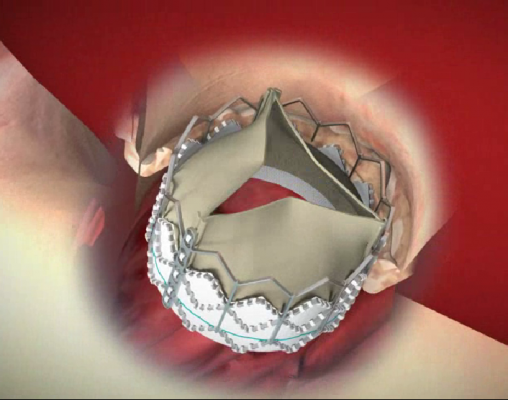
September 18, 2014 — New data from a landmark clinical trial found that after five years, transcatheter aortic valve replacement (TAVR) demonstrated a persistent mortality benefit, improved functional status, and resulted in a lower rate of repeat hospitalizations when compared with standard therapy for patients with severe aortic stenosis who are not candidates for surgery.
Findings were reported Sept. 13 at the 2014 Transcatheter Cardiovascular Therapeutics (TCT) scientific symposium.
According to ACC/AHA guidelines, TAVR is the accepted therapy for patients with severe aortic stenosis (AS) who are not candidates for surgery, based upon the initial results of the randomized PARTNER I trial. However, late clinical outcomes in such patients are unknown. In this long-term analysis from PARTNER I, the five-year clinical outcomes of inoperable patients with severe aortic stenosis were reported. The primary endpoint was freedom from all-cause mortality over the duration of the trial. The combination of all-cause mortality and time to first recurrent hospitalization was also examined.
PARTNER was a prospective, active control trial that randomized 358 patients to either transfemoral TAVR or standard therapy, which often included balloon valvuloplasty. Consistent with the very high-risk nature of the patient population, the five-year all-cause mortality was 93.6 percent in the standard therapy group, but was significantly lower in the TAVR group (71.8 percent, p<0.0001). Median survival was less than a year in the standard therapy group compared with over two years in the TAVR group (11.1 months vs. 29.7 months, p<0.001). Similarly, at five years, re-hospitalizations were nearly half as frequent in TAVR compared to standard therapy patients (87.3 percent in standard group vs. 47.6 percent in TAVR group, p<0.0001). Post-procedural valve areas were maintained in the TAVR group during the entire follow-up period.
Strokes were initially more frequent after TAVR compared to standard therapy, but there was no increased late stroke hazard over five years.
“At five-year follow-up, the benefits of TAVR were sustained – as measured by all-cause mortality, cardiovascular mortality, repeat hospitalization, and functional status,” said lead investigator Samir Kapadia, M.D., director, Sones Cardiac Catheterization Laboratory at the Cleveland Clinic. “The valve durability was demonstrated with no increase in transvalvular gradient or attrition of valve area.”
The PARTNER I trial was funded by Edwards Lifesciences. Kapadia reported being an unpaid member of the PARTNER steering committee.
For more information: www.crf.org, www.tctconference.com


 January 05, 2026
January 05, 2026 









